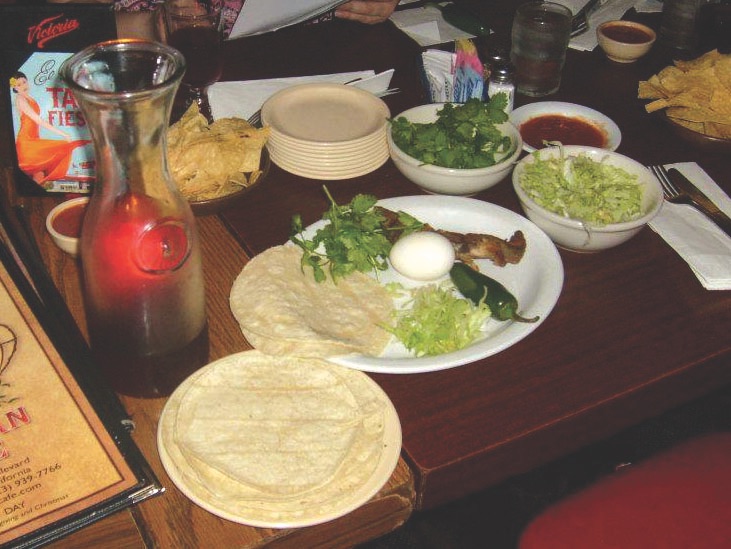 Photo courtesy of Rose Auerbach.
Photo courtesy of Rose Auerbach. A group of anywhere from 10 to 30 people, many of whom have known one another for 20 years, will come together this Passover for their 20th annual seder. Readings will take place from a haggadah written specially for the occasion that will include things like: “This is the bread of affliction. Sometimes it looks like a cracker, but tonight it looks like a pile of tortillas.”
That’s because this seder will take place at El Coyote Mexican restaurant in Hollywood, in what has become an annual tradition known as Mexodous.
Rose Auerbach, a content manager for an entertainment website, has been a regular Mexodous attendee for over a decade and is credited with writing the 15-minute Mexodous haggadah. “That’s Mexodous with a ‘u’ she said, “because tradition!”
Mexodous was born back in 1998, when Eric Halasz and a few friends who knew one another from acting class and didn’t have family in town decided to have their own seder. “But,” Auerbach said, “not a whole seder, because we’ve got stuff to do.”
Hence, the 15-minute haggadah, which Auerbach confessed is shamelessly copied from other sources, “but they’re all credited.” The brevity of the haggadah is one of Mexodous’ defining features. “We wanted to do the whole seder but we just didn’t want to wait three hours to eat,” Auerbach explained.
In its first year, Mexodous was just a handful of friends, all of whom were Jewish, but each year, as the tradition grew, other friends from the acting community joined in, many of whom aren’t Jewish.
“That’s part of what Passover is all about,” Auerbach said. “Getting together celebrating your community.”
“This is the bread of affliction. Sometimes it looks like a cracker, but tonight it looks like a pile of tortillas.” — From the Mexodous haggadah
Why a Mexican restaurant?
“It seemed like a good place to do it,” Auerbach said, “plus the pun [on Exodus] was already there.”
Twenty years in, El Coyote is used to the Mexodous crowd, and the waiters don’t even blink when they see pitchers of water poured into bowls and then salt poured into them.
The “matzot” are indeed tortillas. “It may not be certified kosher, but it’s definitely unleavened bread,” Auerbach said. And if you eat kitniyot (legumes), then you can order the corn tortillas, she added. The herbs are cilantro or jalapeños, the four cups of wine are Sangria. “Although now that Patrón [tequila] has been declared kosher for Passover, we may have to order the fancy margaritas,” Auerbach said. And the charoset is guacamole “because it’s delicious and you can almost build a pyramid out of it.”
Instead of hard-boiled eggs, there are huevos rancheros. “There’s nothing that says the eggs can’t be ranchero,” Auerbach said. Some years, someone brings a lamb shank for the seder plate, but if not, they use beef flautas.
And things “get a little crazy when you make the Hillel sandwich and try to wrap the jalapeño and the guacamole in a tortilla, but that’s part of the fun,” she added.
Also part of the fun are the groan-out-loud industry jokes like, “Moses led his people out of bondage through the Red Sea, just like in the Universal Studios tour.”
Other halachic gems include how Miriam was Moses’ agent, first assistant director and in charge of craft services during the Exodus.
Despite the puns, the short-form haggadah is surprisingly traditional and explains the Passover story in succinct detail. For Auerbach, who grew up secular but whose family always celebrated the Jewish holidays, Mexodous is an opportunity to connect with both her traditions and her friends, especially since her own family moved away from California several years ago. “This really is my family Passover,” she said. “Coming together every year for [Mexodous], we celebrate, we eat … and we pay.”
Indeed, there’s a friendly reminder at the conclusion of Auerbach’s carefully curated haggadah that states: Next year, in Jerusalem, and may all humanity soon be free. Gut yontiff, chag sameach, and don’t forget to tip your waiter.























 More news and opinions than at a Shabbat dinner, right in your inbox.
More news and opinions than at a Shabbat dinner, right in your inbox.